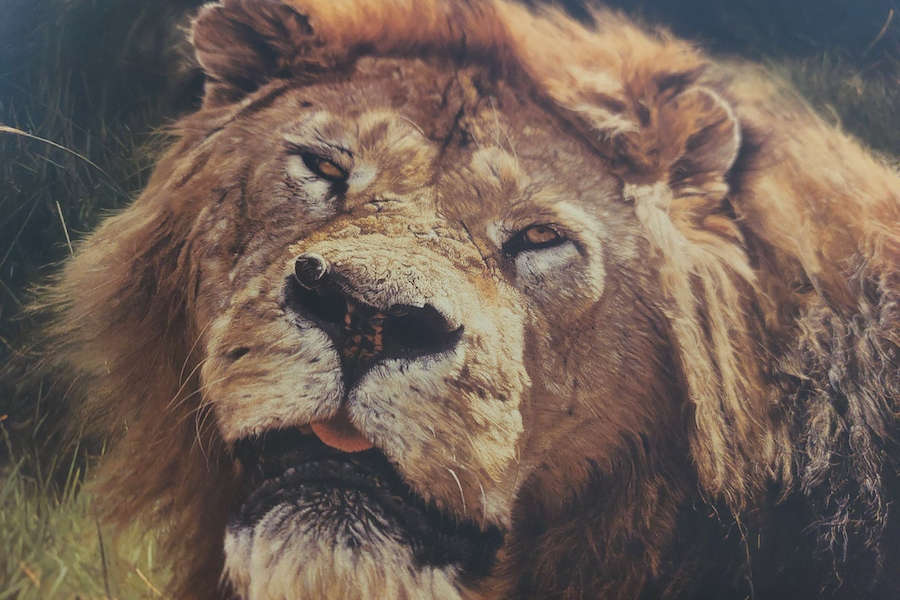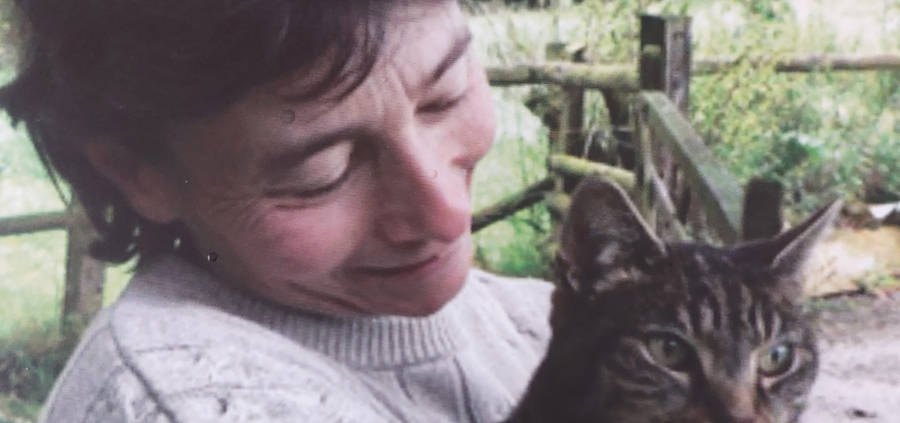The Rhythm of Creation by Michael Ford
Lynne Chitty is a poet and creator of prayers who lives in a small community in southwest England, where she experiences a profound affinity with all creatures great and small.
Watching her grey tabby and soulmate, Eliza, deteriorate and then die in her arms after 19 years together was heart-breaking. But grief became the catalyst for a remarkable international project.
Through the pain of losing Eliza but also gratitude for her companionship, acceptance, and love, the possibility of a book about the animal kingdom “kept my heart from breaking and my tears watered the seed of an idea I’d been pondering for many months,” Lynne said.
The outcome was a stunning coffee table book that is making a difference: Legacy of Love is a celebration of animals in words and pictures by advocates for their protection from around the world. The 325 pages bring together 57 charity founders, actors, poets, artists, and photographers who honor their love of animals in moving words and magnificent pictures. Among the wildlife featured are elephants, giraffes, lions, tigers, leopards, zebras, rhinos, gorillas, and polar bears, as well as creatures of the deep. The publication has already raised over $60,000 for the 20 charities supported by the contributors.
“I wanted to create a book that would be a celebration of kindness and compassion so I could draw people into the soul of nature,” Lynne continued. “I was inspired by the stories of those who are passionate about ending cruelty and who work to provide an environment where animals and people can thrive together, where animals are respected and cherished as sentient creatures, not exploited as commodities or playthings; a book to encourage everyone to feel useful not helpless, to be reassured that every act of kindness, every turning away from greed and exploitation, can make a difference.”
In the heart of the Devon countryside, Lynne’s day begins at 4:00 a.m. in a cabin she shares with her new feline companion, Phoebe. As she lights a candle and welcomes the dawn, she watches and listens as the birds and the garden gradually wake up and come to life. Bats go back into the barn as pigeons are coming out of it.
“The rhythm of creation helps me build a rhythm of prayer and life for myself. The feeding of the animals comes next, then it’s over to the kitchen to make bread for breakfast. It’s been a real joy to discover the meditative prayerfulness of kneading dough and the truth that the yeast can’t be hurried.” Breadmaking is a living parable, she points out, in that all the nondescript ingredients come together to form a delicious loaf. Community, church, and family life is much the same: “We are a mix of individuals, but together form the Body of Christ in this place and every place where we come together.”
After morning prayer, sometimes with retreat guests, the day is filled with a blend of practical work, reading, writing, sharing, and watching the abundant wildlife all around. Table fellowship forms a key part of community life with prayer breakfasts, Bible study lunches, and simple suppers with readings and music.
“My day ends with compline as I listen to the birds singing out their night prayers and, once again, I watch light and darkness kiss each other, like peace and righteousness. The bats come out again and the pigeons go home, and I can blow out my candle, trusting in the enduring faithfulness of God.”
Lynne reflects on these “blessings of the daily” in one of her poems, “Sacred Rhythm”:
As dawn gently draws back the veil of night’s darkness,
and the door of a new morning stands ajar.
Be bold.
Go through to a new experience,
A new opportunity
A new NOW.
Embrace the light that awakens you.
And let thankfulness shine within as brightly as the first candle that you light.
Let it be as the pen that etches the longings of your heart on the crisp new page of a breaking day.
Let trust be the silence that sings quietly in your soul as you breathe in and out.
Leave space between each word, each sigh, each task.
Space enough for presence.
Enriching, healing, guiding your steps moment by moment, hour by hour towards the closing of the day
When dusk gently closes the door and today lays down her tools and slips unafraid, into the welcoming arms of the night stars of tomorrow.
Use each day wisely.
Make time.
Be still.
Honour all you meet.
Savour all you eat.
Befriend yourself.
Laugh at yourself.
Sing with the birds.
Touch the earth.
And let the sacredness of all that you are be the pillow on which you rest your head
Until dawn gently draws back the veil of night’s darkness, and the door of a new morning stands ajar.
Lynne can never remember a time when she wasn’t aware of the suffering of creatures. From flies in spiders’ webs to seal pups being clubbed, tears were never far away. She became a vegetarian when she was 14. As she grew older, she developed also “a deep love for the Creator who was surely suffering too at their abuse.”
Although she went to Sunday School, Lynne didn’t come to faith in Christ until her early 20s, when she attended a wedding and found the priest to be “full of life and passionate about Jesus in an inspiring way.”
The most significant moment of her spiritual journey took place at Gloucester Cathedral, when she was working as a legal drafter at the Land Registry which deals with the ownership of land and property in England and Wales.
“My mother was terminally ill and I would go and sit in the nave on my own,” she told me. “The silence understood. It felt my pain. This wonderful sea of otherness was one with me and I gradually spent more and more time there over the next 20 years. Then, in 2006, having been head server, then a lay assistant, I was ordained a deacon.”
But it hadn’t been a smooth journey for Lynne. Depression had plagued her as an adult and even a course of electroconvulsive therapy (ECT) didn’t completely eradicate the darkness. But she found ways of coping and believes the experience enabled her to engage empathetically with those on the fringes of the congregation and society itself. “I very much saw my diaconal role as being a bridge between the privilege and splendor of the cathedral, and the misery and powerlessness of those on the streets as well as with people whose self-confidence was shot to pieces.”
Lynne says she had always been an animal-loving, book-reading introvert, and the prayer services she devised reflected that, such as half an hour of silence in one of the chapels each day. She began a monthly animal welfare prayer group, and organized Saturday morning prayers with poetry and music followed by a communal breakfast. There were also one-off services down in the crypt, on top of the tower, and everywhere in between. She saw it as a ministry of silence, listening, holding, and weeping.
During her time at Gloucester, Lynne, who is dyslexic, produced a book of poetic prayers and reflections based on her observations and encounters at the cathedral. Many of them celebrate the eternal now, the sense of heaven penetrating the earth. In “The Butterfly,” she recalls:
A butterfly, orange and black,
Rested on the palm of my hand.
As I, in the nave,
Rested in the palm of the cathedral.
And it seemed to me
That its wings beat in time with eternity.
The spirit of fulfilment,
Of nothing, except presence,
Had not passed me by.
And I smiled in awe of joy.
Eventually Lynne decided to leave cathedral life to pursue a more contemplative vocation.
“Contemplatives come in all shapes and sizes with different callings,” she says. “For me, it’s been a call to solitude within a working life, holding the heart of creation, the cries of creation, the pain of creation in my heart, cupping it in my hands which in turn are cupped by those nail-torn hands of Christ and the loving hands of the Creator. So, I’m immersed in the pain but carrying too the light of hope. Intercessory prayer is a big part of my ministry—mostly in silence and mostly alone.”
But compassion for every living creature remains embedded in Lynne’s being and the way she relates to the animal-and-human-shared world.

Anthony Gibbs, “Punchy,” oil on canvas; featured in the book “Legacy of Love”
“I have no answers, no insights, but wrestle constantly with the mystery, the contradictions and the unsolvable questions,” she admits. “My only gut belief is that God sees that through every death and every grief; the torn hands of Christ embrace every victim.
“But does that make it all OK? No. Does it make it OK when a sparrow hawk swoops in and carries off a blackbird? No. It is agony—a God-filled agony—not an empty one but it is still unbearable.
“I think animals can teach us so much about loyalty, resilience, simplicity, and acceptance. But we can’t romanticize them: a bird won’t waste time, energy, and valuable food on a weakling. Nonetheless, on the other hand, Albert Schweitzer writes beautifully about a flock of wild geese who waited for the feathers of one of their number, whose wings had been clipped, to grow again before they flew off.
“So, animals and nature do inspire me but there is a dark side, as there is riven through life. Intellectually I can’t make sense of it, but in my deepest soul I embrace the life within it, while raging and weeping at the brutality and heart-breaking suffering of the animal kingdom.
“As for insects,” she continues, “I am forever putting washed-up worms back on the path, fishing drowning insects out of water bowls, collecting up slugs and relocating them so they can’t be hurt. I see no distinction between animal and human suffering, and I believe in the equal value of all animal, and all human, life. I remember writing a poem years ago about a drowning fly I couldn’t save, and ending it with Christ’s cry of desolation on the cross. Why would God’s heart not break too?”
Many people ask Lynne whether she thinks animals have souls and will go to heaven.
“I’m no theologian, but all I can say is that I believe that the breath of life is a gift from our creator God and that every form of creation carries deep within it something of the essence of the divine,” she explains. “That something is eternal and will flourish when the new heaven and the new earth come to pass, and there will be no more mourning, crying or pain.
“Animals teach us so much, yet how badly we have betrayed them. My hope is that it’s not too late to change hearts, and with courage, humility, and grace, we can go on planting seeds of compassion and dignity to enrich the earth and the creatures we share it with.” ♦
Michael Ford may be contacted at hermitagewithin@gmail.com.





Leave a Reply
Want to join the discussion?Feel free to contribute!